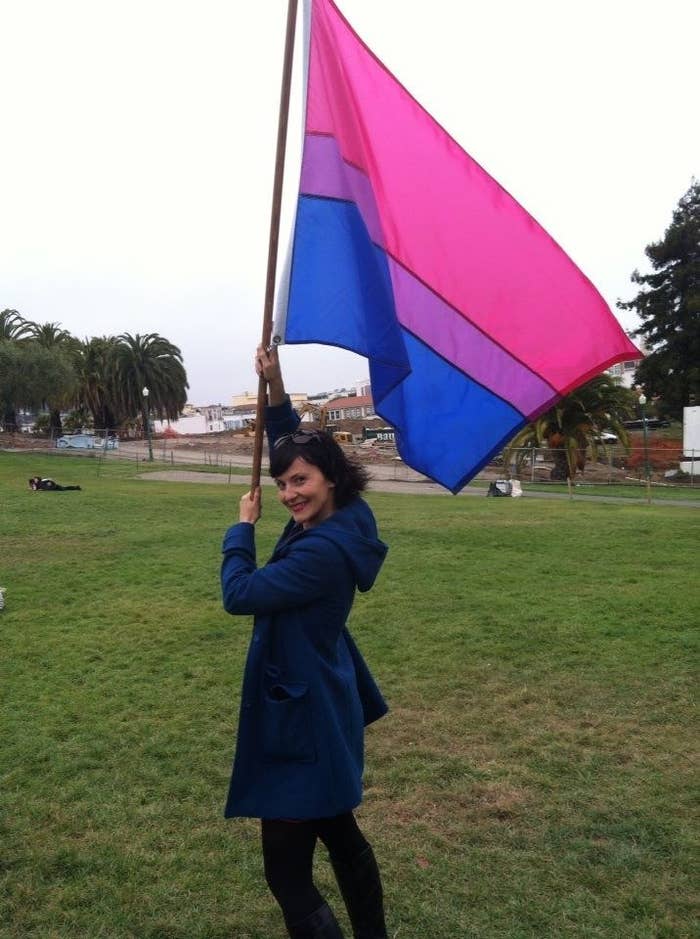
Today is bisexual visibility day. On this day last year I got up the courage to wear a rather small pin with a bi flag that said "visi-Bi-lity" to work. As someone who is not generally a wearer of pins, I saw many colleagues take note, I even explained to some of the more earnestly perplexed that it was "bisexual-visibility day." What was striking was that nobody said anything back, I mean not even anything off the subject. It literally caused a total halt to all coworker niceties. I am not even sure what I expected them to say. There is no social script for supporting bi people. I should note, however, that this was a nonprofit workplace (read: a lot of queers work there) in San Francisco that gets all rainbowed up in June for Pride. My modest attempt at visibility was such a social fail that it made me want to crawl back under the rock, or into the closet, I came from.
After years of being what usually feels like out and proud in the bubble of my private sphere, I still get nervous coming out as bi. I have known I was holding down the middle of the Kinsey scale since middle school and have admitted it to others since high school. And yet and still I often feel like I am giving excess information when I choose to come out rather than be read by others. Intellectually and politically, I know I am simply asking for a basic acknowledgment of how I identify. The reactions I get range from outright biphobia to quieter forms of disapproval and disappointment. Cumulatively, these interactions send the message that I shared something wildly inappropriate or, at the very least, awkwardly extraneous.
The reactions generally imply that I have told people something about my sexual practices, not my identity. Or that I am hitting on them. From hypersexual cultural representations to social science research, mainstream society underlines the sexual in bisexual. It doesn't just underline it, it is bold, italicized, highlighted and all caps. Anyone who has ever done an internet search with the term in it at their place of work, with their monitor in sight of other co-workers found this out the hard way (talking about a friend here, of course).
One of the many perks of heterosexual privilege is that it lets the sexual part conveniently hide. By simply fitting into certain societal expectations friends and family do not need to know too much about your "private life." In a society where sex is rarely discussed, especially within families, coming out as gay or lesbian means coming out as sexual, already an overshare.
While coming out is always a process, and as Eve Sedgewick famously reminded us, that is never complete, coming out as bisexual can feel like a particularly daunting and endless feat. In practice it is often more like walking out of a closet only to discover you are simply in another closet. Before you start feeling like you discovered a cool secret entryway to an alternate reality where unicorns roam free, I should warn you that this next closet only has one door, and it's the one you entered through.
My current closet is a lesbian one. I am a ciswoman who is married to another ciswoman, and, wait for it, we have a child. I have experienced coming out as bisexual very differently from this set of life circumstances. People seem genuinely, if biphobically, concerned for my marriage and family. My bisexuality is a particularly harmful overshare for certain liberal straight people because it ruins their image of me as a respectable gay person who was making them more tolerant. It feels painstaking to even begin to explain why someone who has been given the right to wed still greedily insists on having a sexuality on top of that. Unless of course that sexuality is gay or straight. In which case it is fine. Nobody will ask if you are monogamous or if your spouse is "ok" with "it." ("it" being your sexuality). If are one of those cute people who is so strikingly, romantically unifocused that you call yourself a "Larry-sexual" or a "Brenda-sexual" or whatever, that's your deal. (But since you are reading this article I am going to welcome you under the Bi umbrella, should need it later). The rest of us, though, tend to feel like our identity – sexual or otherwise – preceded our current relationship (and may even outlast it).
So when someone comes out as bisexual, we really have not given you very much information at all. If this disclosure conjures up images of an elaborately staged threesome, those are actually just your own. When someone tells you they are bisexual, you don't actually know how they structure their romantic or sexual relationships and you also don't need to know. You really don't need to ask any follow ups at all. But, when someone tells you it is bisexual visibility day, perhaps you could say something. Even as simple as, "I didn't know that" or "where can I find out more?" or perhaps, dare I dream, you could say "happy bisexual visibility day." I would also settle for a simple, "I see you."

